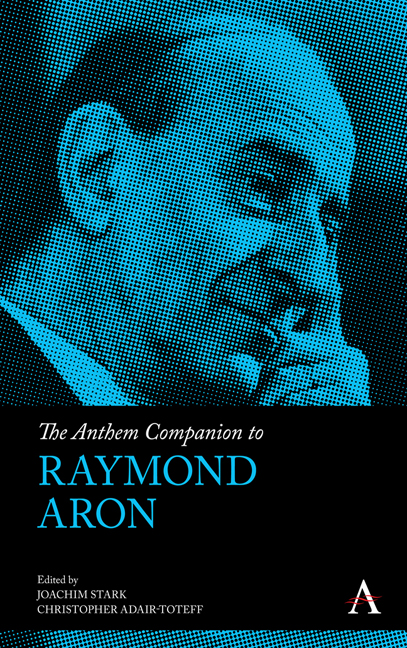Book contents
- Frontmatter
- Contents
- Acknowledgements
- Introduction: Retracing Aron’s Routes to Sociology
- Chapter One The Subject, Pluralism and Équité: Raymond Aron and Sociology
- Chapter Two Aron, Weber and Nationalism
- Chapter Three Equivocal and Inexhaustible: Aron, Marx and Marxism
- Chapter Four The Opium of the Intellectuals
- Chapter Five A New Era in the Human Adventure: Industrial Society and Economic Growth
- Chapter Six Raymond Aron: La lutte de classes
- Chapter Seven Political Philosophy Meets Political Sociology: Raymond Aron on Democracy and Totalitarianism
- Chapter Eight The Contradictions of Prometheus: Wisdom and Action after the Disillusionment of Progress
- Chapter Nine The International Problem and the Question of the Best Political Regime
- Chapter Ten War and Irrationality: Aron and Pareto
- Conclusion: Aron on Liberty
- Notes on Contributors
- Index
Chapter Two - Aron, Weber and Nationalism
Published online by Cambridge University Press: 22 February 2022
- Frontmatter
- Contents
- Acknowledgements
- Introduction: Retracing Aron’s Routes to Sociology
- Chapter One The Subject, Pluralism and Équité: Raymond Aron and Sociology
- Chapter Two Aron, Weber and Nationalism
- Chapter Three Equivocal and Inexhaustible: Aron, Marx and Marxism
- Chapter Four The Opium of the Intellectuals
- Chapter Five A New Era in the Human Adventure: Industrial Society and Economic Growth
- Chapter Six Raymond Aron: La lutte de classes
- Chapter Seven Political Philosophy Meets Political Sociology: Raymond Aron on Democracy and Totalitarianism
- Chapter Eight The Contradictions of Prometheus: Wisdom and Action after the Disillusionment of Progress
- Chapter Nine The International Problem and the Question of the Best Political Regime
- Chapter Ten War and Irrationality: Aron and Pareto
- Conclusion: Aron on Liberty
- Notes on Contributors
- Index
Summary
Raymond Aron was strongly influenced by the writings of Max Weber during two periods of his life and in two different manners. The first occurred in the early 1930s when Aron was working in Germany and wrote German Sociology. While he discussed a number of German sociologists, he focused a major portion of that book on Weber's sociology. The section on Weber not only revealed Aron as a competent interpreter of Weber's difficult sociology but also showed that Aron had learned much from Weber about regarding sociology as an interpretive science. The second period occurred in the 1950s and 1960s and is not quite as defined and delineated as Aron's earlier encounter with Weber's thought. In this second period, Aron concentrated mostly on Weber's politics. While Weber's political thinking influenced Aron's own general thinking about politics, it was specifically manifested in the way in which Aron approached the conjoined issues of “power politics” (Machtpolitik) and nationalism. Weber's influence and Aron's response to it are most fully articulated in the paper that Aron delivered at Heidelberg. This was the famous conference which was held in 1964 in honor of the centennial of Weber's birth. The focus of this chapter is primarily on that paper and is devoted to the ways in which Aron appropriated Weber's thinking about nationalism and modified Weber's approach to Machtpolitik and nationalism. While Aron devoted large parts of his paper to Weber's 1895 Inaugural Lecture at Freiburg, he also examined writings from throughout Weber's life. Given that Weber modified some of his thinking over time, Aron's approach might not have been the most accurate. Nonetheless, Aron offered a clear and mostly accurate account of Weber's main thoughts about nationalism and Machtpolitik.
Aron and Weber
Raymond Aron was a French scholar who was trained as a philosopher, and Max Weber was a German thinker who was educated as a jurist. Yet, they both came to be regarded as the preeminent sociologists of their time. In his biography of Aron, Robert Colquhoun quoted Ralf Dahrendorf who maintained that Raymond Aron was comparable to Max Weber and added that Aron himself regarded Weber as “the sociologist” (Colquhoun 1986a, 1). Indeed, one can argue that Aron not only revered Weber as a sociologist, but he learned from Weber's sociology.
- Type
- Chapter
- Information
- The Anthem Companion to Raymond Aron , pp. 39 - 52Publisher: Anthem PressPrint publication year: 2021

